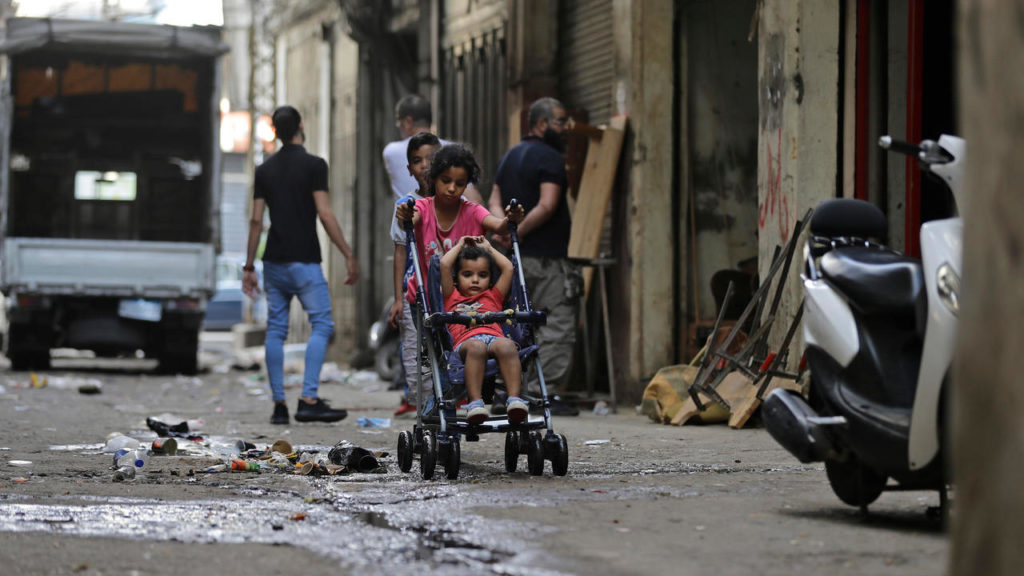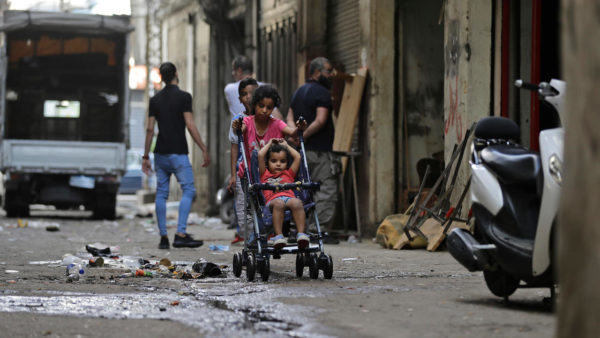Years ago Ahlam had escaped poverty in Lebanon for a better life in Europe, but then a family tragedy forced her back home to a country now in the throes of a raging economic crisis.

In the northern port city of Tripoli, a web of electric wires hangs low over a narrow street as men sit around a table drinking coffee in the Bab al-Tabbaneh neighbourhood.
Inside her small flat in a dilapidated building there, 54-year-old Ahlam leans over the kitchen sink and rinses dishes, her hair and slim body draped in black.
“I escaped the poverty and deprivation we lived under in Bab al-Tebbaneh, only to return back to extreme poverty,” she told AFP, fatigue visible on her emaciated face.
Ahlam is one of thousands in Tripoli now struggling to put food on the table, as Lebanon’s worst economic crisis since the end of the 1975-1990 civil war has rapidly deepened in recent weeks.
The downturn has sparked unprecedented protests nationwide against a ruling elite widely deemed incompetent and corrupt, which includes wealthy politicians from Tripoli.
Ahlam and her husband, seeking better chances abroad, had in 2015 sold all their furniture to join the migrant route to Europe.
They paid a trafficker to take them by sea to Europe, her husband leaving first before Ahlam followed two weeks later on a boat packed with migrants from Syria, Sudan and Afghanistan.
She eventually made it to Germany where she reunited in the Cologne area with one of her sons and they lived a “dignified life” for around two years.
But the death of her other son forced the couple to return to Tripoli to help take care of his wife and two children, so three years ago Ahlam arrived back to build up her life again from scratch.
– ‘Borrow to buy bread’ –
Ahlam found work in the villa of a well-off Tripoli family, earning a monthly wage of 500,000 Lebanese pounds.
That would once have been equivalent to around $330 before the start of the downturn late last year, but it would now fetch barely $100 on the black market.
“My income can only buy me vegetables,” Ahlam said. “I sometimes have to borrow money to buy oil and bread.
“Many days, we just eat leftovers,” she said.
Food prices have risen by more than 70 percent since the autumn, according to the non-governmental Consumer Protection Association.
The inflation has been a blow in a country where more than 45 percent of the population now lives below the poverty line and about one third of the workforce is unemployed.
But Lebanese in Tripoli, long a poorer city with a history of sectarian violence, are among the hardest hit.
According to a 2015 study by the United Nations, 57 percent of the city’s population already lived at or below the poverty line and 26 percent suffered extreme poverty.
Ahlam said she would return to Germany in a heartbeat if she could.
“I no longer feel like I’m part of this country… I’d be ready to try again, just to flee this bankrupt country where we live humiliated.”
– ‘State abandoned us’ –
Tripoli emerged as a vibrant protest hub in the nationwide demonstrations from October last year, earning the city the title the “bride of the revolution”.
After the Lebanese currency plunged to record lows last week, angry protests erupted again, with standoffs between security forces and demonstrators leaving dozens wounded in Tripoli.
In recent months, scores of protesters have rallied outside the homes of politicians in Tripoli against what they describe as the government’s neglect of the port city and its residents.
“All officials in Lebanon are thieves… We should be angry,” said Fayad Darwish, a 55-year-old father of seven whose income has evaporated because of the de-facto devaluation.
Tripoli’s economic struggles were long compounded by sectarian violence.
From 2007 to 2014, the city was the scene of frequent clashes between Sunni residents of the Bab al-Tebbaneh district, and Alawite residents of neighbouring Jabal Mohsen.
With a high number of school dropouts or unemployed among the young men of Bab al-Tebbaneh, many were paid to take up arms while others joined jihadist groups in Syria or resorted to taking and dealing drugs.
“This area has paid heavily in blood for battles that have nothing to do with us,” said Abu Mohammad, a 70-year-old resident.
“We are worried about our youth and the possibility they may slide back into violence and take up weapons again because of growing poverty.”
In a former frontline street near Bab al-Tebbaneh, a group of young men passed around a joint.
Taking a drag, one of men, aged in his twenties, said: “We have nothing else to do.”
“We are all unemployed here,” his friend chimed in. “The state has abandoned us.”
© 2020 AFP/FRANCE24


Leave a Reply
You must be logged in to post a comment.